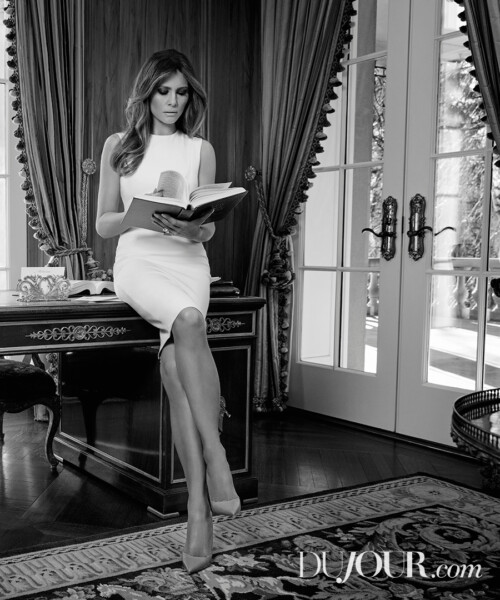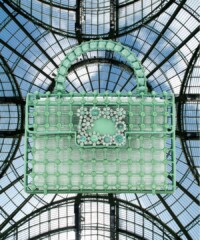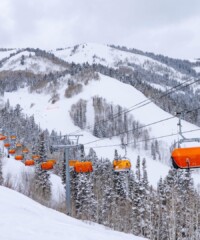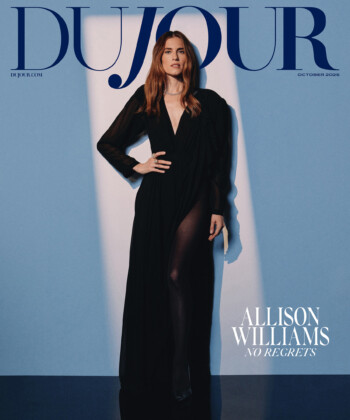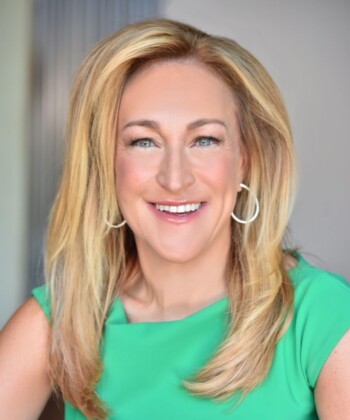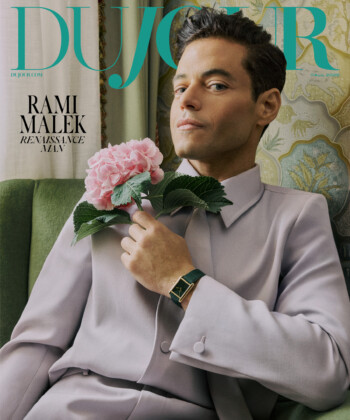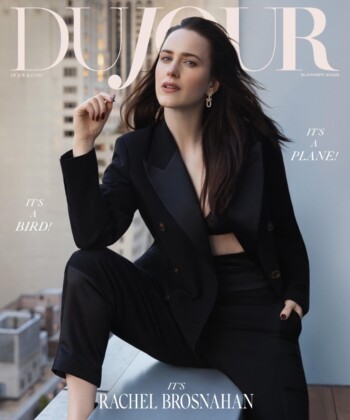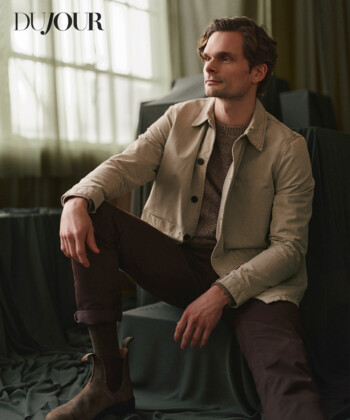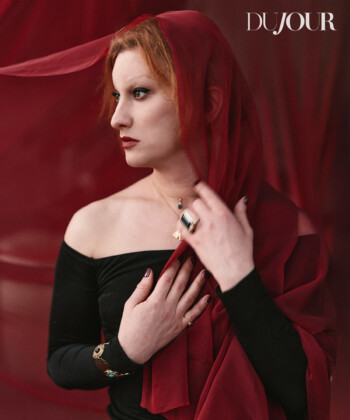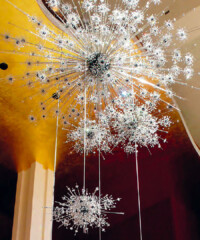Donald and Melania Trump live in a 30,000-square-foot triplex at the top of his namesake tower on Fifth Avenue, and as the race toward the presidency gets shorter and more frenzied, the ratings-hungry cable news networks have started coming to them. On May 4, the day after Ted Cruz dropped out of the race, Donald, 69, appeared live on Today, Good Morning America, Morning Joe, Fox & Friends and The Situation Room—all without leaving Trump Tower. On the morning I visit, Secret Service agents are stationed in the lobby, and everyone entering the building—even those going to the Starbucks—must pass a security checkpoint first. One week earlier, a letter containing a suspicious powder had been delivered to Donald’s office, and while the powder was later deemed non-toxic, the mood is understandably tense.
Once given the all clear, I take the elevator to the 25th floor, where a longtime Trump employee escorts me to a second elevator that rockets us to the 66th floor, where a Secret Service agent awaits. It’s on that floor that finally, behind a hulking gold door, the woman I’m here to meet appears, a picture of repose. Melania Trump, 46, is dressed in a black Chanel coat, slim black pants by The Row and Louboutin heels. A 25-carat diamond ring, an anniversary present from her husband, weighs down one hand. Her much-discussed squint—like a fox caught in headlights—is less prominent in person; otherwise she looks just as you’d imagine. Camera-ready, not a hair out of place. Fiji and Pellegrino water on the coffee table. “Come sit,” she purrs.
This woman is a few months, and swing states, away from becoming our next first lady, but very little is known about her. Magazine profiles inevitably trot out the same recycled anecdotes. For example, when she and Donald met for the first time—at a party in 1998—Melania famously refused to give out her phone number. A year later Donald flirted with running for president, and a reporter asked Melania what kind of first lady she’d be. Without giving it much thought she announced: “I would be very traditional, like Betty Ford or Jackie Kennedy.”
The apartment, which has been likened to a floating Versailles, is as opulent as advertised. There are 18-foot ceilings in the dining room and a heavy marble table; at the end of the room stands a kiddie-size Mercedes-Benz, which 10-year-old Barron Trump has long-since outgrown. And while the apartment might be gaudy, one barely notices the marble fountain in the corner, what with the infinity views of Central Park smacking him in the face. I hear a lone vacuum cleaner whooshing somewhere upstairs, but there’s no evidence of another soul here otherwise. We sit down on a cream-colored couch, and I mention the chaos in the lobby below, wondering aloud: Why would anyone come to a Starbucks that requires a security pat-down?
“I think people find it exciting,” Melania says in her hypnotic, heavily-accented English. “To be in the building and to go through that.”
Presumably Melania can avoid that agitation and have her morning Starbucks order sent up directly, right? “I don’t drink Starbucks,” she says. You don’t drink coffee? I ask. “I drink coffee, but I don’t drink Starbucks. My son likes it, the what do you call it? The Frappuccino? He likes that.”
I don’t get the impression that Melania’s throwing shade at Americans who subsist on 10,000-calorie coffee drinks. This is more like something Gwyneth Paltrow would say on Goop and we’d all roll our eyes but secretly love it. Except this woman’s husband is running for president, and in today’s media environment, any off-script thought immediately becomes a scandal. Like when I ask what Bill and Hillary Clinton got the Trumps for a wedding present in 2005, and Melania says innocently: “I don’t think they sent a gift.” Really? She nods. “Some people didn’t send gifts.”
Is she intentionally fanning the flames? This is the kind of click bait that becomes international chatter, and would she even remember who sent a wedding gift 10 years ago? Or would the faux pas be so weird that she couldn’t forget? While we’re on the topic, what do you even get the person who has everything?
Of the election, she says, “They go after him, so he goes after them. It’s nothing personal. It’s all business. Everybody wants to win. He thinks he’s the one. She thinks she’s the one.”
We’ve been talking for less than 10 minutes when Melania broaches the idea that she’s been misrepresented in the media—her silences interpreted as a lack of intelligence, her marriage as some kind of Faustian bargain. If Donald is a winner, as he often repeats in speeches, she—finally—would like you to know that she is, too. “I had a successful modeling career,” she says, and it should be noted, her QVC line of sparkly jewelry sold out in 45 minutes.
In what ways have you been misrepresented, I ask. “That I’m shy,” she says. “I’m not shy. I know what I want, and I’m selective.” No shame there. It’s just that, in terms of political narratives, this one is a little harder to sell. If Michelle Obama is everyone’s favorite Cool Mom—you know, the one with the toned arms and the perfect J.Crew outfit—Melania is seen as the Queen Bee, the helicopter mom with her own helicopter. If she’s defensive about her qualifications, perhaps she has a right to be, considering she’s getting catcalled on a national stage. Earlier that day, MSNBC’s Chris Matthews was caught ogling her walk, accidentally muttering on-air: “My God, is that good. I could watch that runway show.”
“Unbelievable,” she says of Matthews’ comment. “That’s what I’m saying! I’m not only a beauty, I’m smart. I have brains. I’m intelligent.” She exhales, adding: “I would just say, Men will be men.”
She uses that same phrase—“Men will be men”—when asked about Donald’s old appearances on Howard Stern’s show, which recently resurfaced online. Stern once asked if Donald would stay with Melania if she suffered a horrific car accident, and he replied: “How do the breasts look?” A similar vibe was conveyed when Trump came out on stage at a town-hall meeting at the University of Pennsylvania in 1999 and shouted, “Where’s my supermodel?”
That was entertainment. This is politics (which is maybe also now entertainment but whatever). There’s a lot I really want to ask Melania, but most of all, I want to know: Does she really want this? A year ago she was a private citizen, hocking her wares on QVC or taking her son, Barron, to Paris for the summer. But here we are. And there she is. Who is this woman who might share a bed with our next president? Does she have his ear? If so, what is she saying to him?
“I want to make clear,” she tells me, “in 1999, when they asked what kind of first lady I would be, it was out there that I’d be traditional, a Jackie Kennedy or Betty Ford. But that was 1999. A lot has changed.”

The idea of a 24-hour news cycle feels quaint at this point. I’m meeting Melania on Thursday, May 5, and here’s a small sampling of the morning’s breaking news. The FBI revealed it was interviewing Hillary Clinton’s top aide, Huma Abedin, as part of an ongoing probe into the security of Clinton’s private e-mail server. Donald Trump, the presumptive Republican nominee, tweeted a photo of himself eating a taco bowl in honor of Cinco de Mayo, captioning the photo: “I love Hispanics!” Paul Ryan revealed he’s “just not ready” to support Trump, who then issued his own statement saying: “I am not ready to support Speaker Ryan’s agenda.” A video of President Obama and Michelle dancing with R2-D2 from Star Wars went viral. And to think: We’re only 187 days away from the election.
As Melania explains, she always knew this day would come: “When we were dating in 1999, he was thinking about running with the Reform Party.” The couple briefly broke up in 2000, with the Daily News suggesting then that his focus on the campaign was behind the split. She clarifies: “That was part of it. We were apart for a few months, not long. We got back together. He was always thinking about it. But he loved what he did, he had his business. He was not saying ‘Now is the time.’ He always had that in him.” Things changed in 2014, she says. “He was more into the country, what was wrong with it. Every morning was Fox & Friends.”
She continues: “To be married to my husband, to someone successful as he is, he needs somebody who will tell him the truth. Somebody smart, you know. It’s not just like I’m there and I’m just doing things for him. People say I’m not on the campaign, [but] I’m very involved from home.” She may DVR Empire (which she calls “interesting, something for fun”), but nightly she’s glued to CNN or Fox News. “I like to know exactly what’s going on,” she says. “I give a lot of advice to my husband and tell him how it is and how I see it. I’m not backing off. I tell him the truth.” She also reveals that she’s the one in the family who has his ear. “After a speech, the kids are calling me—Ivanka, [his] sons—saying, ‘Call dad and tell him this and that. He’s listening to you.’ They know I would talk to him and put him in the right direction. Sometimes he does, and sometimes he doesn’t. He will decide what he does.”
When was the last time you challenged him? I ask.
“This morning!” she says, letting out a big laugh. Was it about something political? “No, something else,” she says, almost giggling. “I cannot say. It’s too private. He was upset about some stuff, and I said, ‘Hey, wake up! You did it. Now deal with it.’ ”
When Melania appeared on the cover of Vogue in 2005, dressed in the custom Christian Dior gown John Galliano designed for her wedding—the one embroidered with 1,500 crystal rhinestones and pearls, at the time said to be the most expensive wedding gown ever made—the headline read “How to Marry a Billionaire,” five words that essentially dismissed this woman as a gold digger. But perhaps, in 2016, a more accurate retelling of her origin story is justified. Melania Knavs grew up in Slovenia, the former Yugoslavia, then under Communist control. She was born in 1970 in Novo Mesto, and says her childhood was fairly typical. “I spent a lot of time [doing] after-school activities and homework, and I remember every weekend we visited the grandparents,” she says. “When you grow up you don’t think, Oh, I’m growing up under Communism. You understand what I mean? You’re just a kid. You go on the bike, you do gymnastics, you enjoy your friends. My parents provided a great solid life for our family. I have beautiful memories of traveling.” At 16, her parents took her and her sister to their first concert: Elton John live in Zagreb, Croatia.
But even then Melania imagined a different future for herself. Of Slovenia, she says, “I felt it was kind of too small for me.” Her mother was a pattern maker and designer for the state-owned textile factory and, on trips to Paris, she’d pick up fashion magazines for her daughter. Melania would sometimes sketch her own clothing, which her mother then sewed for her. She cites the birth of CNN in 1980 as opening her eyes to life beyond the Iron Curtain.
At 22, Melania entered Jana magazine’s Look of the Year contest, which felt like a ticket to a new adventure, and while she didn’t win, a seed was planted. She signed with a modeling agency and dropped out of the University of Ljubljana after two years. Her father managed dealerships for the state-owned car company (and later opened his own operation). When asked if he was upset by her leaving school, she says: “No, it was not a big deal. It is what I want to do. It’s my passion. And I always felt like, don’t lose the momentum with what you want to do. Go for it. You don’t want to turn back and say, ‘Oh! Why didn’t I do that?’ ”
Melania (who changed her surname to Knauss because it was easier to pronounce) was by all accounts studious. She never drank, she never smoked. The modeling industry is a notorious minefield for young women. When asked if she’d ever been propositioned by a photographer or agent, she doesn’t hesitate, saying, “Yes. You need to be a strong person. For me, it was no way. The agents, they invite you, ‘Oh, let’s go for a weekend here or there.’ Some girls go for it. I knew exactly how the industry worked. I never went into that. I know when they go to parties, there are drugs, there’s alcohol. It doesn’t bring you anywhere. I always stayed true to myself.”
When independence came to Slovenia, Melania was already away working in Milan and Paris—mostly print modeling—before an agent from Metropolitan brought her to New York and installed her at the Zeckendorf Towers on Union Square, where the 26-year-old shared an apartment with a photographer. At night she sometimes hung out at Cipriani Downtown with a Euro crowd, but she wasn’t dancing on tables. She went on dates, she says, “but nothing else. It was known that I was very tough. Yes, dating, but not dating. Maybe a movie or dinner. I was busy. After a long day, the last thing I wanted to do is get ready and go out at 10 at night and then be up again at six in the morning. I don’t want to feel exhausted. I came here to work. I didn’t come here for hanging out. I came here for my career.”
The work she found was commercial—a job for Bergdorf Goodman, some lingerie and swimwear catalogs. Soon she rented her own apartment, a small one-bedroom that felt like a declaration of independence. “The rent was $2,500 a month,” she says. “I picked it out, everything on my own. I still remember, I went to shop for a TV and an air conditioner. I bought furniture.” Considering the Louis XIV aesthetic of her Trump Tower residence, I wonder what her taste was like in her twenties. Where did she shop for furniture? She thinks about this for a second before she finally remembers the name of the store. “I went to Crate & Barrel,” she says. “Does that still exist or no?”
Melania met Donald at the Kit Kat Club in 1998, at a fashion week party thrown by Paolo Zampolli, the founder of ID Models. She was friendly with Zampolli’s girlfriend, who invited her out that night, telling her they’d pick her up in the car on the way. Melania had no premonition that she’d meet her husband that night. In fact, Donald had arrived with another woman—and tried to get Melania’s phone number while his date was in the bathroom.
“I knew who he was,” Melania says, “but I didn’t know about his life, about what was going on. I had my life. I didn’t care about his. I wasn’t starstruck.” But she called him a few days later. Soon they had their first date, meeting mutual friends at Moomba—a chic late-’90s spot where young socialites did karaoke on Monday nights. “I’d never been before, and Donald hadn’t been either,” Melania says. “We had a great connection, great chemistry.” A few days later he took her to his home in Westchester, a 230-acre property dubbed Seven Springs, and soon Melania was shopping for furniture at Sotheby’s. But she takes pains to point out: “When I moved here with my husband, we weren’t married yet—so I kept my apartment.”
Upon marrying Donald, the world opened up to her in ways she never dreamed. “I met Michael Jackson,” smiling at an obviously happy memory. “It was here in New York in the Pierre Hotel. He called us, so we went over and we had dinner. Just after dinner, we were chatting on the sofa and my husband went into another room to see some art somebody wanted to show him.
And Michael said to me, ‘Hey, when Trump comes back, let’s start kissing so he will be jealous!’ ” They didn’t kiss, she says, “No, no, no. But we were laughing so hard.”
Despite her own substantial fame, Melania is rarely photographed by paparazzi. That’s by design, she explains. “I have a life. I go out every day. I bring my son to school. I pick him up. I’m not an attention seeker. I’m not the one who calls paparazzi, ‘I have lunch with the girlfriends, and I’m going to this restaurant.’ ” I ask her what those after-school pick-ups are like; I can imagine her, like many of my friends with young kids, being forced to make awkward small talk with the other moms and nannies as they wait outside for the kids. “I get along,” she says, sincerely. “[With] the moms at the school pick-up, it’s ‘Hello, how are you?’ But it’s not friends friends. I like quality over quantity.”
Indeed, she isn’t the type to spend every night on the town. She is active in several charities—the American Red Cross and the Boys’ Club of New York—but she prefers time with her son to red carpet events, telling me about Saturdays spent on the sidelines of his baseball games in Central Park. “I was there taking pictures and videos, quietly so he didn’t see me. I was never screaming or cheering. I know my son and he would say, ‘Stop it.’ ” She is up at five forty-five most weekday mornings to have some time to herself before she wakes Barron, whom she once described as a mini-Donald—at 7 years old, he preferred a suit-and-tie to sweats, though he’s long since outgrown that phase. “The third floor is Barron’s,” she says. “It’s much easier that way. For him as well. He has friends over, he has his toys. He has a play date tomorrow and is bringing two friends over. They come here, they go upstairs and they play. They kick a ball, they play with iPads. I don’t allow Xbox before homework is done.”
Marrying a celebrity, Melania says, requires strength. “When you walk in a room, everybody knows the person. Sometimes people see you with that man and maybe they know more about the man, and they judge you or see you differently. You need to know who you are and you need to be very secure. You need to stand up for yourself. You need to have your own yes and no.” When Donald is on the road campaigning, they talk several times a day, but there is no evening routine. “We don’t Skype,” she says. “We don’t text. He’s only a phone person. No e-mails and no texts.”
As she repeats more than once, she is fiercely independent. Before Donald announced his candidacy, “I said to him, ‘You really need to think, because our family life will change.’ The three of us will change. I know what it takes, traveling and all that stuff. I told him if he really wanted to do that I would support him 100 percent. But I would also be a mom first, I would be with our son, I would be home. Our son needs parents, and I don’t want somebody other than me taking care of him. We made that decision. It’s a big decision [to run], and a selfless decision. To go into that is very selfless because of what we’re going through.”
She deflects a question about whether she’d move to the White House should Donald be elected—“It’s tradition,” she offers, “but we are not there yet, so for me it’s a little too early to talk about it”—but, with this election, Melania is keenly aware of what’s at stake for her family. What she’ll miss, it seems, are the simple moments, like when Donald and Barron return home from a father-son dinner. “When they come home, Barron tells me how it was, and all three of us will be together in the living room, watching TV and talking about it. It’s very cozy. The best is when we would go—not anymore—but we’d have unforgettable moments when Donald was driving and Barron would sit in front. I’d be in the back. And the three of us going somewhere with nobody around.”
While Melania often declines to discuss her politics publicly, it’s clear she and Donald are united on the talking points—none more so than on the topic of immigration. Donald has called for an immediate deportation of approximately 11 million undocumented immigrants living in the United States. He has also proposed a ban on all Muslims entering this country. (London just elected its first Muslim mayor, Sadiq Khan, who I guess should visit New York soon if he’d like to see Hamilton?) Melania came to the United States on what’s called an H1-B visa, which generally requires a bachelor’s degree or higher. (According to a 2013 Bloomberg account, due to some congressional technicality, foreign-born fashion models are almost twice as likely to receive H1-B visas than computer programmers.) Melania rightfully points out that she came here legally, flying home to Slovenia to have her passport stamped whenever required. She got her green card in 2001 and became a citizen five years later. But as she echoes her husband’s proposed policies, I wonder if she has sympathy for someone who, like her, wanted to come to the United States for a better life, but couldn’t get an H1-B visa or couldn’t afford an immigration lawyer?
“The law needs to be changed to help those kind of people,” she says. “But they can’t just sneak in and be here. That’s what I’m saying. I do have sympathy. I’m a very compassionate person. But don’t sneak in and stay here without papers. We need to follow the law. If the law needs to be different, we need to do that.” The Muslim ban—which Donald had re-affirmed his support of that very morning—led Michael Bloomberg to call him a demagogue. When I mention that the comedian Louis C.K. flat out compared Trump to Hitler, Melania stares blankly back at me.
Do you know who Louis C.K. is, I ask.
“No,” she says, shaking her head. But she continues: “We know the truth. He’s not Hitler. He wants to help America. He wants to unite people. They think he doesn’t but he does. Even with the Muslims, it’s temporary.” She concedes: “Maybe he needs to say it in a softer way. He doesn’t go after religions. He feels like we need to know who’s coming to this country. If not, we don’t have a country. That’s how he feels. We see how he is, and he wants to unite the country and bring people together and bring jobs back.”
I can’t help but wonder what kind of hate speech her supporters might unleash on me for asking a few pointed questions. A GQ reporter who dug into her family’s past—turning up the existence of a secret 50-year-old half-brother in her native Slovenia whom her father has never acknowledged—was subjected to anti-Semitic threats online. Of the GQ article, Melania says: “I have thick skin. It doesn’t bother me if they write about me because I know who I am. But what right does the reporter have to go and dig in court in Slovenia in 1960 about my parents? They’re private citizens. If they go after me, it’s different. But to do that, it’s a little bit nasty, it’s a little bit mean.” So if people put a swastika on my face once this article comes out, will she denounce them?
“I don’t control my fans,” Melania says, “but I don’t agree with what they’re doing. I understand what you mean, but there are people out there who maybe went too far. She provoked them.”
I don’t want to give her ideas, but Donald knows good television when he sees it. Why not invite Melania’s half-brother on TV and have a teary reunion special?
“I never met him,” she says. “He’s had his own life. I wish him all the best.”
Some have taken Melania’s absence on the campaign to mean that she’s somehow aloof, something her friends dispute. “There’s no such thing as ‘along for the ride,’ ” says Steve Hilbert, the CEO of Sterling Investors Life Insurance and a longtime friend of the Trumps. “She recognized this country needs leadership.”
And she is not nostalgic for the past. Donald has visited Slovenia exactly once according to The New Yorker—a three-hour dinner on the way home from London. Melania’s parents, however, have their own apartment in Trump Tower and spend much of their time in New York, which gives Melania peace of mind when she has to be away from Barron.
Melania traveled to Iowa with Donald earlier this year. Where did you stay? Who did you talk to? “It was kind of a fun experience,” she says. “We stayed in a hotel. It was clean. It was, I think, a Holiday Inn. You do it in a fun way. My husband knows me and how I am. I like beautiful stuff. I live the life. It’s funny when we go and travel. They don’t have five-star hotels there, but you go with it. It was a great experience in Iowa, because we went to an Evangelical church on Sunday. The church we got married in is very different. In Iowa there was a band, there was singing. It was very different, but it was a great experience. Being on the campaign trail and traveling around the country is hard work.”
Whether she wanted any of this, who knows. Stephanie Winston Wolkoff was working at Vogue when she met Melania more than a decade ago. She is now president and CEO of her own consulting agency, SWW Creative, and the two have become close friends, having lunch together once a month and even traveling to the Trumps’ Mar-a-Lago estate in Florida. She calls to put her friend in context, saying, “Don’t underestimate her just because she is quiet and reserved. There is virtue in the fact that she appears to be quiet and isn’t on the front lines constantly saying, Hear me, see me. But she’s very confident in her viewpoint. She does not agree with everything that [Donald] says or everything that’s being done, but she believes in the greater good. They are a power couple. They are each other’s teammate.” She adds: “He’s out there. He has so much going on. It isn’t about her yet. She has always said, when and if the time comes, she will step up. She’s a wife and a mother until that day comes.”
Before I leave, Melania offers me a tour of the apartment. She has to head out soon herself, she says: “I am picking up my son and taking him to the dentist.” We’re staring out at the massive skyscrapers coming up along 57th Street, and then we turn to look at Central Park—so lush and green this time of year. It’s one of the most coveted views in the world. “It’s beautiful,” she says. “You kind of get used to it, but still you know, especially now, it’s beautiful.” And with that, she walks me to the hallway, where a Secret Service agent waits in a stairwell designed for the help. Donald’s Secret Service name is reportedly “Mogul.” What will hers be?
“I don’t think about it,” she says. “I take it day by day.”

























